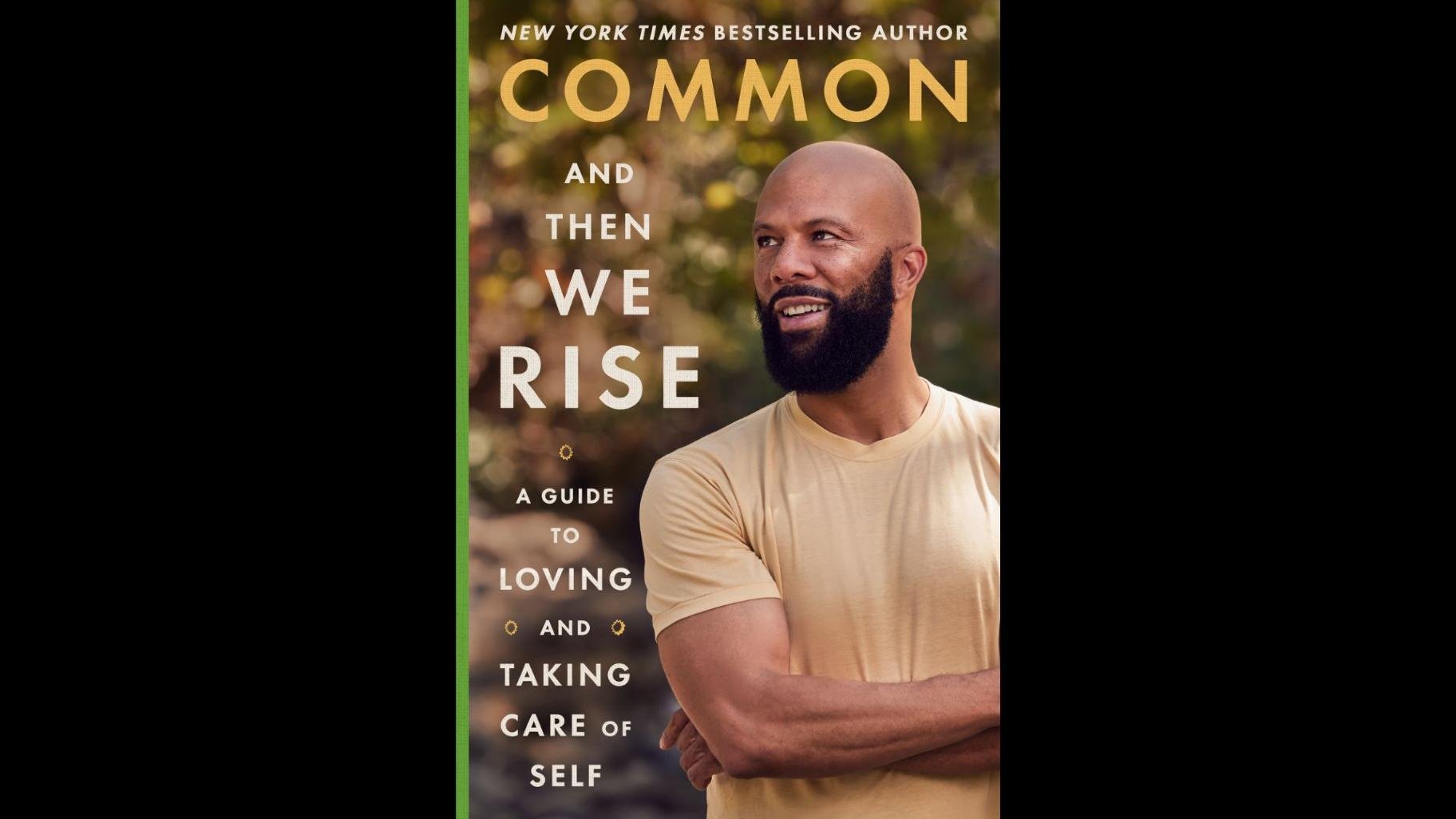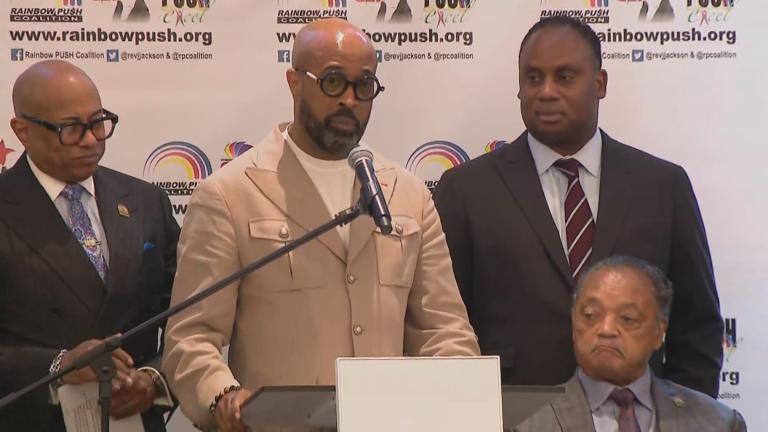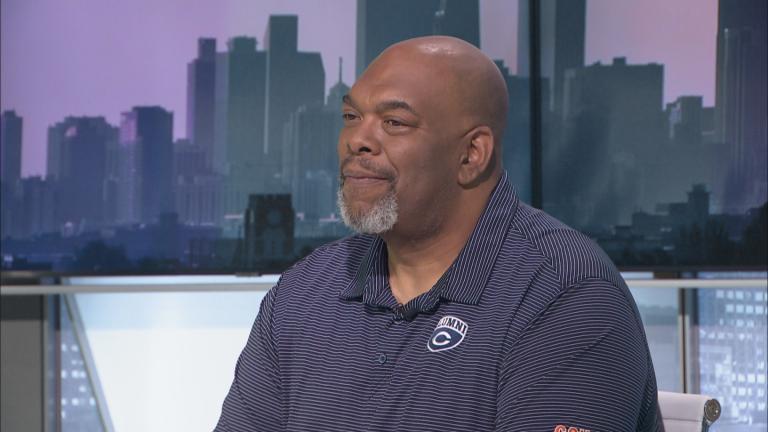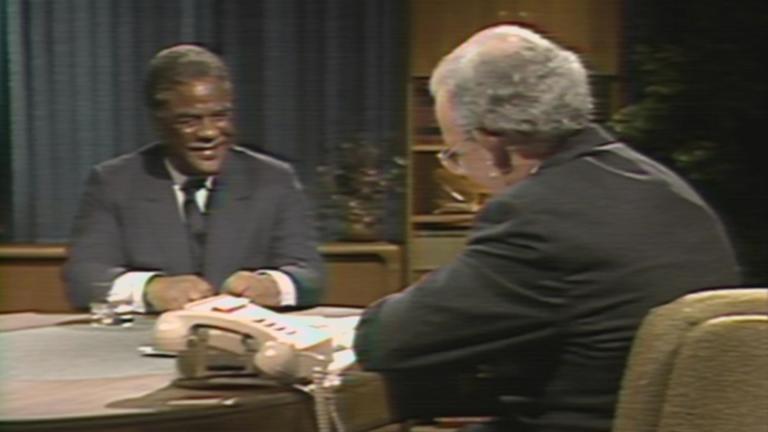Rapper, actor and activist Common was in Chicago this week to promote his latest book, “And Then We Rise: A Guide to Loving and Taking Care of Self.”
The Chicago native sat down with WTTW News co-anchor Brandis Friedman at the Chicago Public Library to talk about the book and some of his activism.
WTTW News: What influence did the pandemic have on writing this book?
Common: The pandemic was, like, a turning point for me to want to share it. Before, it was something that I was like, OK, this is, this is what I do, this is the way I live. I think during the pandemic, what happened was people reached out to me, to ask me certain things. You know, conversations I would have at dinner, people would talk to me about their diets, in a way of seeking. Their curiosity, let me know they wanted to be better.
And also during the pandemic, the workouts that I would do on Instagram Live. People across the country would say something to me like, ‘Wow, man, them workouts. I used to work out with you when you was on IG live, and man, that helped me through the pandemic, I really thank you for that.’ And I really didn’t know how much cause I was doing it for fun and just, like, OK, I’m gonna share this while we at home, like, cause I know my friends would enjoy it. So I just shared it, and that let me know that it was time for me to spread the word of things that I may have experienced and know.
And, yes, it’s my experiences and some of my thoughts. But I also, I talked to Dr. Tracy Rico, who’s an integrative doctor. She uses integrative medicine, which is Western and Eastern methods of healing. I talked with my therapist, and she’s in the book. I talked with my trainer who gave us workouts in the book. And a vegan chef who is tremendous named Lauren Von Der Pool who gave me recipes. But she’s been a big component in times where I really needed to focus and either do something for a role or when I was doing a play on Broadway(and) I needed that type of diet to function at the highest levels.
There was something you wrote early in the book that I found interesting. You write that Audre Lorde calls taking care of herself “political warfare.” Whoa, what does that mean?
Common: First of all, Audre is, she’s a special writer and has a special philosophy. It’s just powerful and to say that taking care of self is political warfare is in alignment, it’s so what I wanted this book to be about. Because I’m a firm believer in, like, the greater we love ourselves, the more we take care of ourselves, the more we’re combating the negative things that are out there in the world. It’s like you don’t give them space to get to you. It’s like you have an armor up when you are like really centered in yourself and in your higher self, the things that are just trying to get at you, the negativity, the negative conversations, the negative information, the negative tweets and the racism and the sexism. It has less of a chance to get into your aura, into your spirit, into your heart because you just have built yourself up to just not be on that vibration. It’s almost like they speak another language that you don’t even understand because it’s so negative, you ain’t on that negative language. So it’s like you don’t accept it.
We deal with enough anxiety and depression out here in this world. So, like, what’s the thing we have power over? Ourselves, our self-care. That’s one of the things we truly have power over every day.3
 Common released “And Then We Rise: A Guide to Loving and Taking Care of Self” in January 2024. (Provided)
Common released “And Then We Rise: A Guide to Loving and Taking Care of Self” in January 2024. (Provided)
The four pillars of the book are: food, body, mind, soul. How do you bring that message to some of the young folks in Chicago for whom caring for self is just not something that’s top of mind for them because they’re fighting some other battles?
Common: I totally understand it. ‘Cause I’d never even heard that term, like, self-care and self-love, like growing up ‘til I was in my mid-20s. But I’ll say, one thing I do know about the youth of Chicago, and youth everywhere, they wanna achieve, they wanna do something in life and be something and use their lives towards something that they dream of and wanna excel, and these things about taking care of self are the steps towards getting to whatever your vision and goal is.
This is like eating the proper foods, eating foods that are just cleaner foods. And that doesn’t mean you gotta be vegan and vegetarian. I’m just saying cleaner. Or adding just simple things like water and vegetables to your diet will affect the way you feel and think, like food has emotional weight to it, too.
Like, it doesn’t cost you either to take a little time in the morning just to like feed yourself like whatever you need. It might be a mantra that you say to charge yourself up. It might be a scripture that you feel is like encouraging you and strengthening you, taking the time to just settle and meditate.
I wanted to pivot and talk a little bit about criminal justice reform because I know it’s something that you’ve spoken up on before. You and Imagine Justice have funded the Rebirth of Sound program at Stateville. Why is that something you felt it was important to speak out on?
Common: I was having a conversation with a woman named Michelle Alexander. She wrote a book called “The New Jim Crow.” And “The New Jim Crow” is about how from slavery to the Jim Crow laws to the prison industrial complex, mass incarceration, it’s all been plights to keep Black people as second-class citizens. The prison industrial complex is keeping Black and Brown people as second-class citizens. So when I was having this conversation with her, I was telling her my thing is about trying to help Chicago. And she kinda broke it down to me simple: how men and women being incarcerated was actually perpetuating the violence that goes on. Because you’re taking fathers out of the home, you’re taking people, sometimes mothers, out of the home. And even when people go to jails and prisons, 80%, I think it’s 89% of the population, comes back. And if they don’t come back healed or changed, then they bringing even that back to the environment.
The people that are participating in our program, I get to see videos to be honest and they’ve sent songs and it’s like, ‘Yo, this stuff is really good work.’ And I know how important creativity can be towards healing and towards restoring your community. So for them, I know it’s been benefiting them, and they’ve expressed it and it’s one of the things that I’m most proud of and inspired by.
What would you say to the men in Stateville who are watching right now?
Common: To the men in Stateville, I’m just wanna say, y’all, your humanity is glowing. It’s showing in different ways. I know many people outside that are free, just think, like, ‘OK, man, y’all did something and, and that’s it, you’re wrong.’ But it’s a lot of people that truly do care and believe in forgiveness, believe in healing, believe in the humanity in you. And thank you for taking the steps to actually, like, show your humanity and show your creativity. Your going from dark to light is actually changing the lives of other people. And continue to do it. It’s not being overlooked or unheard. Keep your eyes on the prize, keep that bright outlook cause anything can happen in a positive way.
Follow Brandis Friedman on Twitter @BrandisFriedman








